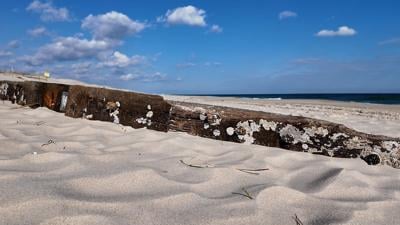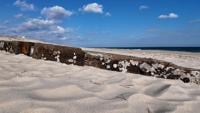WORCESTER COUNTY, Md. -- A fourteen-and-a-half-foot wooden fragment recently surfaced on the shores of Assateague State Park. Identified by the Maryland Historical Trust, this maritime relic is believed to be a remnant from a ship dating back to the mid to late 1800s.
This discovery aligns with Assateague State Park's inclusion in the Shipwreck Tagging Archaeological Management Program (STAMP). This initiative is designed to amass data regarding the movement of shipwrecks along the coast, offering insights into their historical origins.
To facilitate efficient tracking, the STAMP Program has employed a methodical approach, embedding identification tags directly into the weathered wood. This strategic tagging enables rapid identification should the artifact reappear in a different coastal location.
Park Ranger Kirby Brown articulated the program's broader objectives.
"The hope is that we can use these shipwrecks to gather the data and hopefully backtrack where that shipwreck came from and hopefully use it to discover other shipwrecks as well," said Brown.
Despite the program's intentions, skepticism has emerged concerning the release of substantial wooden remnants back into the ocean. Concerns range from potential boat collisions to interference from local wildlife. Visitors like Sydney Hitch have voiced apprehensions about the risks associated with allowing such sizable artifacts to drift at sea.
"I mean, maybe like boats hitting it or, you know, animals getting to it as it comes apart," said Hitch.
Acknowledging these concerns, Brown said given the time of year and nature of the ocean, the park is not too worried.
"We're not seeing a lot of boat traffic going out there, and as for a wooden piece like this, once it goes back out to the water, usually it's going to get buried under the sand pretty quickly, so we don't see it posing a significant risk to the public and boaters," said Brown.
As for what's next, the timber will remain exactly where it is, on the beach at Assateague State Park, until the tides pull it back into the Atlantic.



